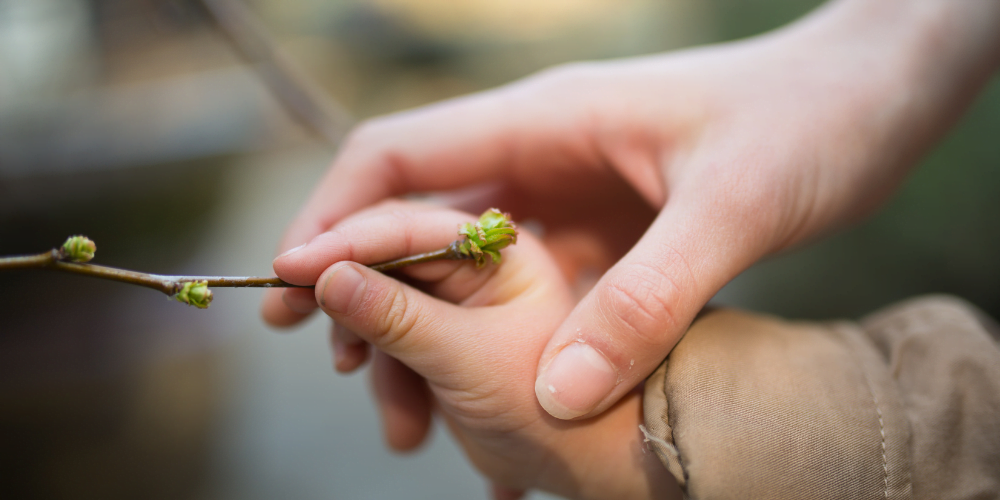Conscious Parenting
by Ed and The OM Team | Conscious Living, Parenting
HELPING CHILDREN DEAL WITH GRIEF
You can’t protect your children from the pain of loss, but you can help them learn to cope.
At this time more and more people are having to face bereavement and a barrage of media counters scrolling the infections and deaths statistics. This is compounded for many by being cut off from family, friends and communities.
This is especially difficult for children, young people and families who are grieving for a loved one. The lockdown, social distancing restrictions and safety measures introduced in response to the coronavirus pandemic have affected funerals, memorial services and other rituals that help to bring ‘closure’ and acceptance in sad circumstances. The numbers who can attend a funeral service in person are limited and friends and extended family members may not be able to comfort each other or express their grief as they would otherwise have done.
Most young children are aware of death, even if they don’t understand it. Even if they have past experiences with death, children may not understand the relationship between life and death. To them, death is not a permanent condition. It may be a common theme in cartoons and television, but so many cartoons show a character being mortally wounded and then coming back to life that many children may develop unrealistic expectations of the world around them. But experiencing grief first-hand is a different and often confusing process for youngsters.
Many parents wait until a death occurs to work with their children on dealing with the idea of death. But that can be especially difficult if the parents are dealing with grief themselves. Taking time to reflect on your own beliefs about death and sharing your experiences with your children, helps them prepare for loss when it eventually happens. You can’t protect a child from the pain of loss, but you can help him feel safe. By encouraging him to express his feelings, you can help him build healthy coping skills that will serve him well in the future.
Children grieve differently
Faced with the death of someone close (or a cherished pet), a child may go from crying one minute to playing the next. His changeable moods do not mean that he isn’t sad or that he has finished grieving. Just as their attention span is shorter when they are young, so is the amount of time they can handle an intense emotion. Playing can be a defence mechanism to prevent a child from becoming overwhelmed. Play may involve the idea of death; dolls or stuffed toys may ‘die’ and be mourned, only to return to normal the next day. Children have different ways of working through their grief and this is just one of them.
It is also normal at any age to feel depressed, guilty, anxious, or angry at the person who has died.
Encourage a child to express feelings. Bottling up emotions doesn’t do anyone any good and children are no exception. Encourage them to express how they feel. If they lack the word power, there’s a lot to be said for a large sheet of paper and some very messy paints! There are many good children’s books about death and reading these together can be a great way to start a conversation with your child.
Keep it simple
Try to answer your child’s questions as simply as possible. Don’t volunteer too much information, as this may be too much for the child to take in. Stick to the truth and avoid euphemisms that may be misunderstood. Very young children often don’t realise that death is permanent. Older children understand the permanence of death, but they may still have many questions. It doesn’t matter if you can’t answer everything; being there for your child is what is important.
Your own behaviour will impact on your child. Don’t hide your grief but don’t let it take over your life. Having a good cry together will probably do both of you good, but it needs to be followed by an activity that will help your child to handle his emotions. Important as it may be to grieve over the death of a loved one, it is essential for your child to understand that life does go on.
Getting ‘closure’
Whether or not to take a child to a funeral depends entirely on you and your child. A funeral provides a neat ending to a chapter in the child’s life, but exposing them to the visible and audible grief of adults could confuse them. “If Granny has gone to live happily ever after with Jesus, why is Aunty Jean crying?” If your child wants to go to a funeral, make sure that you prepare him for what he will see. Tell him some people will probably be crying. He should be warned in advance about the coffin or casket, too.
Planting a tree or making a small memorial garden are perhaps more suitable ways for a child to say farewell than attending a funeral.
The idea of a life after death can be very helpful to a grieving child. Even if you aren’t religious you can comfort your child with the concept that a person continues to live on for as long as those who love them still think of them.
After the death of a parent or grandparent, children will naturally worry about the possible death of other members of the family. Reassure a child that he is loved and will always be cared for. Younger children may become extra-demanding, crying about having to go to school or asking for help with tasks they previously mastered just to get your attention. They may revert to bed-wetting or stop sleeping through the night. Older children may have trouble concentrating on tasks and fall behind with their studies.
It’s important to be on the lookout for signs that your child is having an especially difficult time processing the loss. The symptoms, like clinginess or difficulty sleeping, should resolve gradually over time. If your child’s symptoms are getting worse, it could be a sign they need professional help in dealing with their feelings. While not all children require grief counselling, it does provide another outlet for talking when a child may feel he can’t talk with other family members, because they are also grieving. It is a good idea to consult your child’s health practitioner if you feel that your child isn’t recovering from a loss in a healthy way.
Mindful parenting or as we at Odyssey ‘say’ conscious parenting and co-parenting both emphasise being present, fostering empathy, and encouraging open communication, which is so apparent in this powerful article by Ray Lacey. Custody X Change published a guide that offers practical strategies for co-parents to navigate their journey with mindfulness and compassion.
https://www.custodyxchange.com/topics/custody/advice/co-parenting.php


